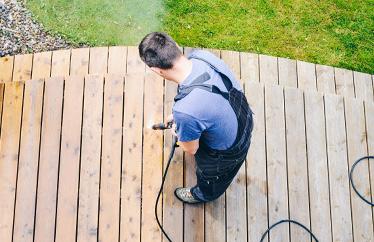Monsoon season in the US is typically experienced in the Southwest and occurs due to the extreme daytime desert heat mixing with the shift in wind patterns that begin to flow in from the cooler, moist ocean air, creating the perfect recipe for thunderstorms. Because these storms occur in areas that don’t typically experience much rainfall throughout the year, flash floods are a serious danger, as are lightning strikes.
Keep reading for ways to prepare for the inevitable monsoon season and think proactively to avoid costly home insurance claims.
Roof, Gutter and Window Maintenance
Before monsoon season, it is imperative to ensure that your roof, windows, and home gutters can handle the incoming weather. If you live in an area with a particularly serious monsoon season, you may want to have a licensed roofing expert evaluate your roof for needed repairs. Free inspections are usually easy to find. If you are a member of the Hippo family, we offer complimentary Hippo Home Care consultations to our customers.
Next, clean out gutters and install gutters guards if you haven’t already. While recent surveys have found that cleaning out your home’s gutters tops the list of chores that homeowners hate, this simple task can prevent a laundry list of possible damages that can happen to your home. The addition of gutter guards will help cut that chore time in half, as well as assure you that your gutters are sitting pretty most of the year.
Take your time evaluating the seals and weather stripping around all doors and windows. This will protect against problems big and small, from mold or mildew build-up, to more considerable, water-related damage like seepage and leaks.
Invest in Smart Home Devices
Water damage is not only one of the most common home insurance claims, but it can also be one of the most costly. Whether you choose to invest in a smart flood sensor, smart leak detector, or smart water detector with automatic valve shut-off is entirely up to you and the needs of your specific home. Working smarter, not harder, against potential water damage to your home will not only provide you with a sense of security without having to constantly check for water leaks and damage in hard to see places but installing these smart devices can also end up paying for themselves with the amount of money they will save you on your home insurance premium and out of pocket expenses in the long run.
Pay Attention to the Weather
Keeping track of weather information as it is coming is paramount to know what you may be up against, especially if the weather forecast is ever-changing. Here are some of the most popular ways to stay current on weather information:
- Watch your favorite weather channel/forecast
- Follow your favorite local news stations or favorite weather people on social media
- Download a reliable weather app and make sure to keep the notification on, at least during your area’s severe weather seasons
- Make sure your radio is tuned to the NOAA weather radio station
Store Supplies Correctly
Floodproofing the items in storage around your home can be one of those things you may not think about until after the storm has come and gone. Before monsoon season arrives, move as many of your valuable items to the highest points of your home. Whether that means attics, upper floors or even to the highest shelves in closets and cupboards, a few extra feet can make all of the difference when it comes to possible damage.
For an extra layer of protection, you may want to look into waterproof safes or lockboxes, especially for important documents or items that are especially valuable. Most of these safes or lockboxes protect from both fire and water damage, so you can rest assured in both cases.
Make an Emergency Supply Kit
No matter whether it is monsoon season or not, natural disasters can strike anywhere. That’s why it is so essential to include emergency weather preparedness in your homeownership plans.

Whether you’re a meticulous planner or the “go with the flow” type, it’s essential to know where your emergency kit is, what’s in it, the last time it was updated, etc. Not sure where to start? Download our template here.
Know your Home’s Risk of Flash Flood
All homes live in a high-risk, low-risk or moderate-risk flood area whether you experience monsoon season or not. Luckily, homeowners can check out many resources to determine their community’s risk of flash flooding.
You may also want to check with your HOA or local government for possible local resources to help further assess your flood risk.
Power Outage Preparedness
As annoying as power outages can be, you need to be prepared for them as a homeowner, from how to prep your home for extended periods without power to keeping everyone entertained and safe throughout the power outage. For our complete guide, click HERE.
If your utility company is estimating a short outage, you don’t need to do too much. You can dip into your emergency rations for food and play games to pass the time. But if they’re unable to give an estimate, you’ll need to begin rationing. Start by taking inventory of how many non-perishables you have, and figure out how long you’ll be able to sustain yourself at home before needing to venture out.
Post-Storm Air Filter Replacement
With monsoon season comes water and dust. Even though you should change your air filter quarterly, it is a great idea to replace it after any severe weather brought on by monsoon season to protect your home’s air quality better. Doing this can prevent dust, mold, bacteria and allergens from building up after keeping all doors and windows sealed up tight.
Double Check Home Insurance Policy
If you are consumed by worry about the upcoming monsoon season, it can be hard to remember that your home insurance policy can make all the difference once the rain stops. While many perils are covered under a standard homeowners insurance policy, it’s good practice to know precisely what is and isn’t covered by your policy so that there are no unexpected surprises. Working with a modern home insurance provider like us, we can walk you through how to protect your home just as quickly as we walk you through the claims process.
Ready or not, monsoon season comes every year. It is a recurring weather phenomenon that homeowners can prepare for to handle potential problems and avoid more substantial repairs when proactively prepared. Here at Hippo, we know that owning a home is a lot of responsibility, so we are available at your convenience, 24/7. The more you know, the more you will be able to get out of your homeowners insurance policy when you need it most.




